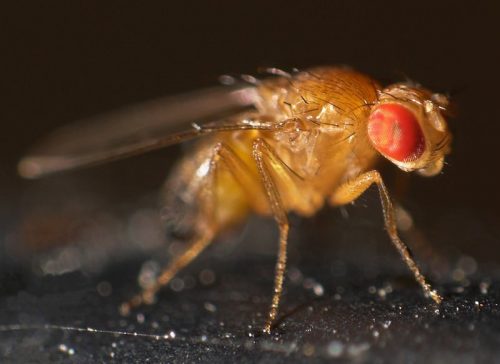Ask ten students how much they sleep and you’ll end up with ten different answers. Although it’s generally accepted that eight hours a night is a good goal, scientists are unsure how much sleep is necessary for survival. Sleep is poorly understood, especially considering that sleep consumes almost a third of our lives. But since every animal seems to sleep, scientists often conclude it must have some necessary biological function. Yet, one research team at Imperial College London showed that the common fruit fly is able to survive with barely any sleep for its entire natural lifetime.
In past studies, animals—including rats, cockroaches, pigeons, dogs, and fruit flies— were forcibly kept awake for weeks, and all seemed to have early deaths. However, a closer examination of those experiments reveals that the methods used to keep the animals awake were often stressful and violent, from trapping cockroaches in an endless hamster wheel to walking dogs to their deaths. Thus, these studies were unable to conclusively prove that sleep deprivation was the cause of death rather than the stress from the actions used to keep the animals awake.
Researchers recently coupled modern technology and the power of statistics to design a better fruit fly experiment. For this experiment, individual fruit flies were trapped inside a narrow tube while a high-resolution video camera processed their movements with a machine learning algorithm. The researchers could determine when the fly was asleep, awake, or performing what the researchers called “micromovements,” like rubbing its hands together. Instead of having graduate students manually monitor the flies, the system would automatically detect if a fly had dozed off, enabling thousands of flies to be studied without human supervision. “If we had done this experiment on a smaller number of flies, we would have seen quite different results,” said Giorgio Gilestro, the principal investigator, explaining why sleepless flies had never been found before.
Initially, these researchers only tracked how much time each fruit fly spent sleeping—an average of ten hours per night for male fruit flies and five for females. This sexual dimorphism is primarily explained by female fruit flies’ need to eat more frequently, as they need more protein to create eggs. Interestingly, three of the 1,366 flies observed slept for less than twenty minutes over a twenty-four-hour period. These insomniac flies are a small portion of the studied flies, but they show that sleep might not be as necessary as previously thought.
Afterwards, the fruit flies were placed into a special tube with a small rotor attached to it. Every time that the video camera tracking the flies noticed a lack of movement for greater than twenty seconds, the tube holding the flies would rapidly spin for a second. This process would wake up the fruit fly up while also “trying to remove the stress component,” Gilestro said. Consequently, the 160 fruit flies subject to this treatment for their entire lifetime survived just as long as their non-sleep-deprived partners.
Why, then, would we evolutionarily develop neural pathways that lead to sleep, a state that leaves us stationary and senseless for hours, unless it is absolutely necessary? One possible explanation is that there are multiple levels of sleep, and the fruit flies were still achieving the bare minimum for survival. Fundamentally, a certain amount of sleep is needed to preserve basic biological processes, like flushing out toxins from the brain. A second level of sleep enables peak cognitive skills and faster reaction times. A third level of sleep is primarily for comfort, but also to protect animals from predators. Most animals have a nest or home that they return to, far away or shielded from danger. Having regular sleep schedules allows the animal to stay in a safe environment, rather than be caught by a wandering predator.
Both the naturally sleepless flies and the ability for flies to survive without any sleep are fascinating results that are bound to be tests in the near future. Unfortunately, this new research does not mean that students can pull all-nighters with no consequences. Numerous studies on humans do show that decreased reaction time and cognitive function are correlated with lost sleep. However, finding sleepless flies in nature may lead use to better understand why we humans—and indeed, all animals—have to sleep in the first place.

